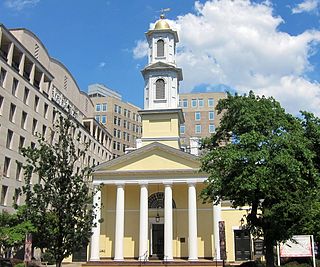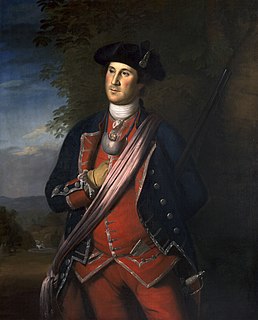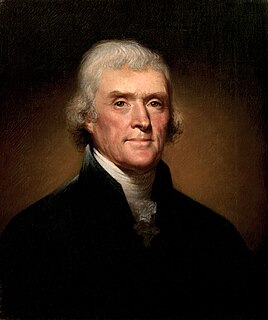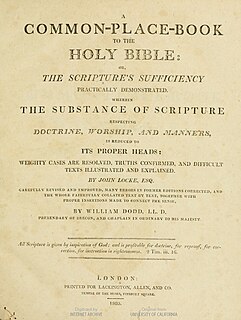Deism is the philosophical belief which posits that although God exists as the uncaused First Cause – ultimately responsible for the creation of the universe – God does not interact directly with that subsequently created world. Equivalently, deism can also be defined as the view which asserts God's existence as the cause of all things, and admits its perfection but rejects divine revelation or direct intervention of God in the universe by miracles. It also rejects revelation as a source of religious knowledge and asserts that reason and observation of the natural world are sufficient to determine the existence of a single creator or absolute principle of the universe.

The religious affiliations of presidents of the United States can affect their electability, shape their stances on policy matters and their visions of society and also how they want to lead it. Speculation of Thomas Jefferson, Abraham Lincoln, and William Howard Taft being atheists was reported during election campaigns, while others, such as Jimmy Carter, used faith as a defining aspect of their campaigns and tenure to hold the office. Almost all of the presidents can be characterized as Christian, at least by upbringing, though some were unaffiliated with any specific religious body. Protestants predominate, with Episcopalians and Presbyterians being the most prevalent. There have been four Nontrinitarian presidents, and a single Roman Catholic president. No president thus far has been openly an atheist. However, it has been acknowledged that two US presidents—Thomas Jefferson and Andrew Johnson—had no religious affiliation.

The Age of Reason; Being an Investigation of True and Fabulous Theology is a work by English and American political activist Thomas Paine, arguing for the philosophical position of Deism. It follows in the tradition of eighteenth-century British deism, and challenges institutionalized religion and the legitimacy of the Bible. It was published in three parts in 1794, 1795, and 1807.
Unitarianism is a Christian theological movement named for its belief that the God in Christianity is one person, as opposed to the Trinity which in many other branches of Christianity defines God as three persons in one being: the Father, Son, and Holy Spirit. Unitarian Christians, therefore, believe that Jesus was inspired by God in his moral teachings, and he is a savior, but he was not a deity or God incarnate. As is typical of dissenters, Unitarianism does not constitute one single Christian denomination, but rather refers to a collection of both extant and extinct Christian groups, whether historically related to each other or not, which share a common theological concept of the oneness nature of God.

The Life and Morals of Jesus of Nazareth, commonly referred to as the Jefferson Bible, is one of two religious works constructed by Thomas Jefferson. The first, The Philosophy of Jesus of Nazareth, was completed in 1804, but no copies exist today. The second, The Life and Morals of Jesus of Nazareth, was completed in 1820 by cutting and pasting with a razor and glue numerous sections from the New Testament as extractions of the doctrine of Jesus. Jefferson's condensed composition excludes all miracles by Jesus and most mentions of the supernatural, including sections of the four gospels that contain the Resurrection and most other miracles, and passages that portray Jesus as divine.

Liberal Christianity, also known as liberal theology, covers diverse philosophically and biblically informed religious movements and ideas within Christianity from the late 18th century onward. Liberal does not refer to progressive Christianity or to political liberalism but to the philosophical and religious thought that developed and grew as a consequence of the Enlightenment.
Deistic evolution is a position in the origins debate which involves accepting the scientific evidence for evolution and age of the universe whilst advocating the view that a deistic God created the universe but has not interfered since. The position is a counterpoint to theistic evolution and is endorsed by those who believe in both deism and the veracity of science.

The Faiths of the Founding Fathers is a book by historian of American religion David L. Holmes of the College of William & Mary. Holmes approaches the topic of the religion of the founders of the United States by analyzing their public statements and correspondence, the comments left by their contemporaries, and the views, where available, of clergy who knew them.

The religious views of George Washington have long been debated, and relate to the religious views of the American Founding Fathers.
Thomas Morgan was an English deist.
Scientology founder L. Ron Hubbard described Scientology as "the Western Anglicized continuance of many earlier forms of wisdom", and cites the teachings of Jesus among belief systems of those "earlier forms". Jesus is recognized in Scientology as part of its "religious heritage," and "is seen as only one of many good teachers."

The religious views of Thomas Jefferson diverged widely from the orthodox Christianity of his era. Throughout his life, Jefferson was intensely interested in theology, religious studies, and morality. Jefferson was most comfortable with Deism, rational religion, and Unitarianism. He was sympathetic to and in general agreement with the moral precepts of Christianity. He considered the teachings of Jesus as having "the most sublime and benevolent code of morals which has ever been offered to man," yet he held that the pure teachings of Jesus appeared to have been appropriated by some of Jesus' early followers, resulting in a Bible that contained both "diamonds" of wisdom and the "dung" of ancient political agendas.

Christian deism is a standpoint in the philosophy of religion, which branches from Christianity. It refers to a deist who believes in the moral teachings—but not divinity—of Jesus. Corbett and Corbett (1999) cite John Adams and Thomas Jefferson as exemplars.
The pre-existence of Christ asserts the existence of Christ before his incarnation as Jesus. One of the relevant Bible passages is John 1:1–18 where, in the Trinitarian interpretation, Christ is identified with a pre-existent divine hypostasis called the Logos or Word. There are nontrinitarian views that question the aspect of personal pre-existence or the aspect of divinity or both.
The following outline is provided as an overview of and topical guide to theology:
Deism, the religious attitude typical of the Enlightenment, especially in France and England, holds that the only way the existence of God can be proven is to combine the application of reason with observation of the world. A Deist is defined as "One who believes in the existence of a God or Supreme Being but denies revealed religion, basing his belief on the light of nature and reason." Deism was often synonymous with so-called natural religion because its principles are drawn from nature and human reasoning. In contrast to Deism there are many cultural religions or revealed religions, such as Judaism, Trinitarian Christianity, Islam, Buddhism, and others, which believe in supernatural intervention of God in the world; while Deism denies any supernatural intervention and emphasizes that the world is operated by natural laws of the Supreme Being.
Deism is the philosophical belief which posits that although God exists as the uncaused First Cause, responsible for the creation of the universe, God does not interact directly with that subsequently created world. The deists, differing widely in important matters of belief, yet agreed denying the significance of revelation in the Old and New Testaments. They either ignored the Scriptures, endeavoured to prove them in the main by a helpful, or directly impugned their divine character, their infallibility, and the validity of their evidences as a complete manifestation of the will of God. Deism manifested itself principally in England towards the latter end of the seventeenth century.
















